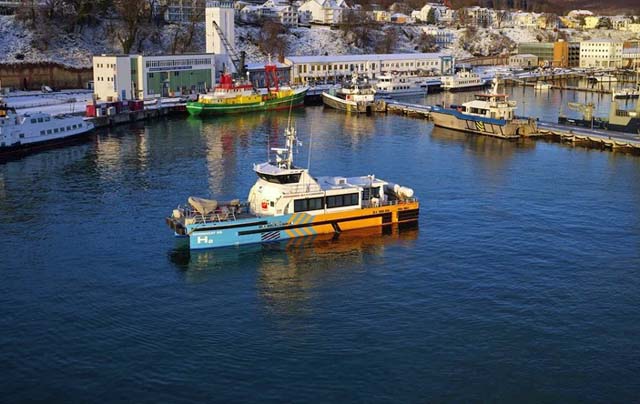FRS Windcat Offshore Logistics (FWOL), a joint venture between FRS Offshore of Germany and Dutch company Windcat has begun operating what is said to be the first hydrogen-powered dual-fuel Crew Transfer Vessel (CTV) in the German Baltic Sea, for 50Hertz.
The Hydrocat 55 is equipped with CMB.Tech’s dual fuel hydrogen technology. Belgian company CMB.Tech is another shareholder in FWOL. The vessel is said to represent an innovation for the offshore wind industry and marks a significant step in decarbonising operations for Flensburg-based FWOL. The new vessel joins five other ships currently operated by FWOL in the German and Danish North and Baltic Sea, all sailing under the German flag.
The dual fuel hydrogen system of the Hydrocat 55 allows a significant reduction in CO2 emissions during operation and a substantial decrease in NOx emissions by up to 70%. With a length of 25ms, the CTV accommodates 24 persons and 2-3 crew members and has a tank capacity of 207kg of hydrogen in 27 cylinders. The engine is manufactured by MAN Engines for dual fuel use and retrofitted by CMB.Tech with a hydrogen injection system. By using hydrogen, Hydrocat 55 can significantly reduce diesel consumption and save CO2 emissions. At the same time maximum flexibility and safety is ensured. The Hydrocat 55 is similar to the Hydrocat 48, launched in 2022, which was the first H2 powered CTV for operations in Belgium.
In collaboration with Windcat, five more CTVs of this type are under construction. Additionally, work is ongoing to optimise the ship’s technology for even higher decarbonisation in the future. The trial period commences in January 2024 and will run for a year with regular use of green hydrogen. The deployment of this innovative CTV strengthens the over 10-year lasting partnership between FWOL and 50Hertz. Berlin-based 50Hertz is the transmission system operator responsible for grid connection of the wind farms in the German Baltic Sea. Currently, two other vessels from the fleet are in operation for the company. Hydrocat 55 represents another step towards a more sustainable future in the offshore wind energy sector for both companies. The testing phase aims to provide valuable insights into the integration of hydrogen propulsion in the maritime logistics industry.
No fundamental changes to the main engine are required, which not only means that maintenance and repair remain simple, but also that the engine can easily be switched back to diesel fuel without any modifications. Even if hydrogen is not available, the vessel can continue to run on traditional fuel, making it a robust and reliable solution for the offshore wind industry.
Tim Kunstmann, FWOL said: “Looking to the future, FWOL is committed making a significant contribution to the decarbonisation of offshore logistics and supporting a green production of renewable energy with the Hydrocat 55 and the further vessels of this type.”
Willem Van Der Wel, Windcat said: “With this announcement, we are showing that our group strategy is becoming a reality with the focus on decarbonization and optimisation. We are reducing the carbon emissions of our customers in the offshore wind industry, today. We’re grateful to have such great customers and local partners who help drive this strategy.”
Image credit: 50Hertz – M. Vogel



